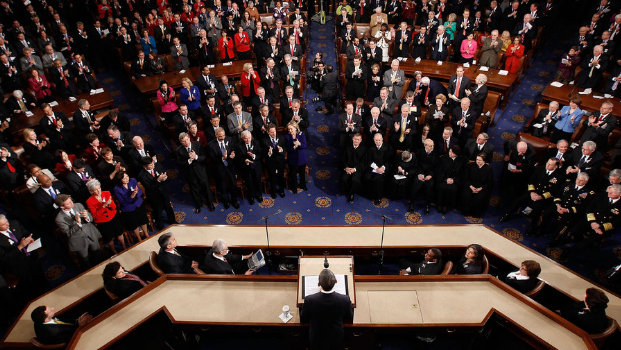Dialogues: A Solution to Political Polarization? Probably Not.
First of all, what is political polarization–and what do dialogues have to do with it?
If you have been politically engaged this past year, or even the past few years (stretching as far back as the middle of the Bush years in 2004), the term political polarization may sound familiar to you.
If you are not familiar, however, the term political polarization is generally used to refer to the divergence of political attitudes toward ideological extremes. As an example, a 2014 Pew Research Study found that Democrats and Republicans are consistently deviating from moderate views, and placing themselves further toward liberal and conservative extremes. In short, Republicans are moving further to the right, and Democrats are moving further to the left.
On the right, this is evidenced by drastic changes in ideological consistency, with only 6% of Republicans identifying as “consistently conservative” in 2004, but jumping to a (perhaps unsurprising) 20% in 2014. It is safe to assume that now, in 2018, that figure is even higher. In fact, as of a December 2017 Pew Research Study, approximately 86% of Americans describe the conflicts between Democrats and Republicans as either strong or very strong.
It is also worth mentioning that, while we are consistently become more divided between left and right, the left and right themselves are becoming increasingly polarized. You may have recognized this with, for example, the Democratic coalition being largely united in its condemnation and opposition to the Trump Administration, but the left itself having deep fissures in political ideology.
Think back to the months leading up to the 2016 presidential election, *shudders* you may or may not remember the Democratic primary when democratic socialist candidate Bernie Sanders gained a formidable following amongst predominantly young voters. While Sanders ran on a platform with politics that may have better aligned with leftist ideology than rightist, his proposed policies (free education, Medicare-for-all) were still in stark contrast to the more moderate Hillary Clinton’s.
In fact, there is a hotly contested debate surrounding a claim that Sanders supporters who ultimately ended up voting for Donald Trump in the 2016 election, in spite of Hillary Clinton, cost her the presidency. If we are to believe the figures, which have been used to estimate that 12% of Sanders’ primary voters ended up voting for Trump in the general election, then it could be said that these ‘defective’ Sanders supporters cost Clinton the election, specifically in her “blue fire-wall” states of Pennsylvania, Michigan, and Wisconsin. Of course, it would be wise to attach caveats to these estimates.
Even so, the sheer absurdity–and plausibility–of the idea that Sanders supporters could have ultimately given the presidency to a candidate who blatantly contradicts most all left-wing principles highlights the profound and far-reaching consequences of polarization in modern politics.
So, partisan animosity is growing at a seemingly unprecedented rate, we no longer trust each other with control of the government, and echo chambers perpetrated by an increased use of social media are making it harder to have civil conversations with one another–where do we go from here? First, we must ask more questions. What is a dialogue, what does it take to open one, and, most importantly, why do we need them?
Well, by definition, a dialogue is both a type of conversation and a means by which we can relate. This is important to understand, because, above all, a dialogue intends to facilitate our innate human ability to relate to one another.
It is also vitally important to recognize the distinction between a dialogue and all other conventional forms of communication. For example, the two parties engaged in a debate or a discussion aim to persuade one another of the accuracy of a particular idea or belief, often becoming defensive and reactive as they try to justify their opinion and convince one another that their opinion is the ‘correct’ one. This tendency to be unable to express ideas or opinions that we feel strongly about without getting into a dispute is why public discourse about divisive issues so often results in group division.
In contrast, dialogue lacks a predetermined agenda, instead seeking only to listen and inform rather than to persuade. In this way, dialogue emphasizes improving the way individuals with extreme differences can relate to one another rather than to resolve some form of dispute between the two.
A productive dialogue will see conflicting opponents, otherwise unlikely to agree with one another, come to an understanding of each other’s perspectives. As the participants listen to one another after leaving behind any reservations or assumptions, they are exposed to new perspectives, which, through an inherent curiosity, leads them to reflect on their own views. In practice, a mutual understanding is reached.
Of course, one reason political polarization has been able to reach such a large scale in the United States is that of our cultural tendencies. Competitive individualism, the idea that an individual’s success depends solely on his or her efforts, is a cultural convention which has been emphasized deeply in American society since its conception. As a result of this type of thinking, many Americans tend to shift the focus of a conversation to themselves and their own interests; it simply makes more sense to Americans to act in (what they may perceive as) their best interest rather than having a sustained regard for others’ thoughts and concerns. This idea is neatly summed up in the uniquely American concept of conversational narcissism, a tendency to steer a conversation toward oneself and away from others.
This is not to say, however, that Americans are inherently incapable of cooperation and dialogue engagement. This is, of course, reflected in our country’s history of congressional bipartisanship.
Certainly, this is not the first time that individuals have gone to extremes to distance themselves from one another on the grounds of ideological differences, and it will not be the last. Even so, we should not dismiss such extreme polarization as a fixed aspect of society; it would be a mistake to normalize a behavior that makes our communities divided, our lawmakers incompetent, and our beliefs unfounded.
Will dialogue provide us with a solution? Probably not. Dialogue will, however, provide us with a starting point. That is why we need it.












































